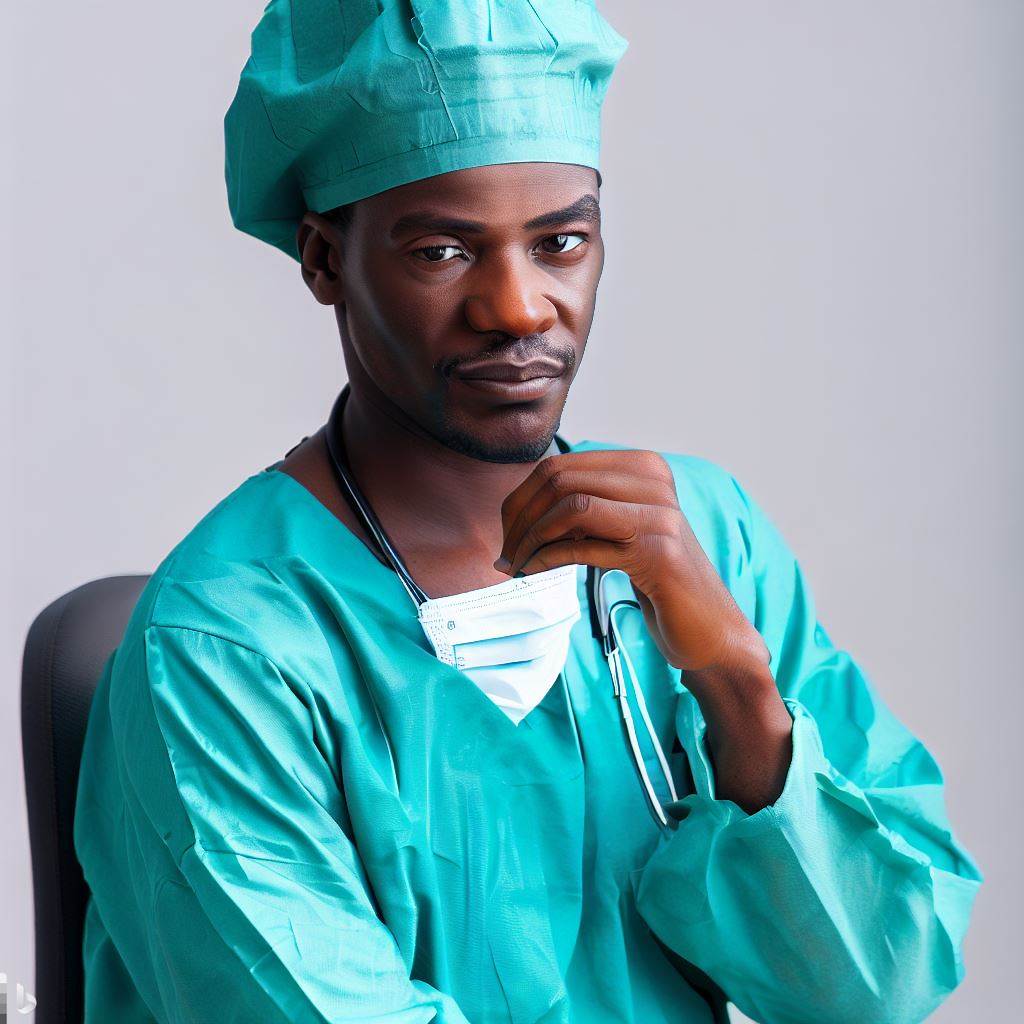Introduction
Speech-language pathology in Nigeria focuses on diagnosing and treating speech and language disorders. Acquiring the necessary skills is crucial for speech-language pathologists to provide effective interventions.
Speech-language pathology is a discipline in Nigeria that focuses on diagnosing and treating individuals with speech and language disorders.
It is a specialized field that requires professionals to possess specific skills and knowledge to successfully help individuals overcome their communication difficulties.
The importance of acquiring the necessary skills for speech-language pathologists cannot be overstated.
These skills include strong communication abilities, both verbal and nonverbal, as well as an in-depth understanding of language development and communication disorders.
In addition, critical thinking and problem-solving abilities are crucial for accurately assessing and formulating treatment plans for patients.
Speech-language pathologists also need to be proficient in a variety of therapeutic techniques, such as articulation therapy, language intervention, and fluency treatment.
They must have the ability to adapt these techniques to the unique needs of each individual client, ensuring that therapy is tailored to their specific needs.
Cultural sensitivity is another essential skill for speech-language pathologists in Nigeria.
It is important to consider cultural beliefs and practices in the therapy process, as they can significantly influence the effectiveness of interventions.
Being able to effectively collaborate with other professionals, such as teachers and doctors, is also crucial for providing comprehensive care.
In the end, speech-language pathology in Nigeria plays a vital role in improving the communication skills of individuals with speech and language disorders.
Acquiring the necessary skills, including strong communication abilities, an understanding of language development, and therapeutic techniques, is crucial for effective intervention.
Cultural sensitivity and collaboration with other professionals further enhance the quality of care provided by speech-language pathologists in Nigeria.
Educational Background
A speech-language pathologist in Nigeria must possess the necessary educational qualifications to effectively diagnose and treat language and speech disorders. These qualifications include:
Bachelor’s degree in Communication Sciences and Disorders
Obtaining a bachelor’s degree in Communication Sciences and Disorders is the first step towards becoming a speech-language pathologist in Nigeria.
This degree provides students with a solid foundation in understanding the various aspects of communication disorders.
Master’s degree in Speech-Language Pathology
In addition to a bachelor’s degree, it is essential for aspiring speech-language pathologists to pursue a master’s degree in Speech-Language Pathology.
This advanced degree equips them with the necessary knowledge and skills to evaluate and treat individuals with communication disorders.
Additional certifications and specialized courses
To enhance their expertise and stay updated with the latest advancements in the field, speech-language pathologists in Nigeria should pursue additional certifications and specialized courses.
These courses can help them develop a deeper understanding of specific areas of speech-language pathology, such as pediatric speech disorders or augmentative and alternative communication.
Continued professional development through workshops, conferences, and seminars is also essential for speech-language pathologists to stay abreast of emerging research and trends in the field.
Overall, obtaining a bachelor’s degree in Communication Sciences and Disorders, followed by a master’s degree in Speech-Language Pathology, forms the educational foundation for speech-language pathologists in Nigeria.
Additionally, acquiring additional certifications and participating in specialized courses allow them to expand their knowledge and expertise in specific areas of speech-language pathology.
Read: Respiratory Therapist Education: Nigerian Universities
Knowledge of Speech and Language Disorders
Understanding the different types of speech and language disorders
- Articulation disorders, which affect the production of speech sounds.
- Fluency disorders, such as stuttering, which disrupt the flow of speech.
- Voice disorders, including problems with pitch, volume, or quality of voice.
- Language disorders, which impact understanding and expression of spoken or written language.
- Pragmatic disorders, affecting social communication skills and interactions.
As a speech-language pathologist in Nigeria, having knowledge of speech and language disorders is essential.
Understanding the various types of disorders enables an SLP to effectively address their clients’ needs.
Articulation disorders, for example, involve difficulties in producing speech sounds accurately, while fluency disorders disrupt the flow of speech, often seen as stuttering.
In addition, voice disorders can affect pitch, volume, or quality of voice, while language disorders may impact understanding and expression of spoken or written language.
Pragmatic disorders, on the other hand, can lead to challenges in social communication and interactions.
Familiarity with the causes, symptoms, and diagnosis procedures
Speech and language disorders can have various causes, including genetic factors, neurological conditions, and developmental delays.
Common symptoms may include difficulties in producing sounds, using appropriate grammar, understanding instructions, or maintaining a conversation.
To diagnose speech and language disorders, a speech-language pathologist (SLP) conducts assessments, interviews, and collects relevant information.
Diagnostic procedures may involve standardized tests, observation of communication behaviors, and collaboration with other professionals.
Familiarity with the causes, symptoms, and diagnosis procedures of speech and language disorders is vital for an SLP.
These disorders can stem from genetic factors, neurological conditions, or developmental delays.
Symptoms may manifest as difficulties in producing sounds, using correct grammar, understanding instructions, or maintaining conversations.
To diagnose communication disorders, SLPs employ various assessment techniques. This includes conducting interviews, observations, and collecting relevant information from the client and their family.
Standardized tests, along with collaboration with other professionals, may also be utilized during the diagnostic process.
Proficiency in assessing and evaluating clients’ communication abilities
An SLP needs to possess strong assessment skills to determine the nature and severity of a client’s speech and language difficulties.
Assessment tools may include tests, questionnaires, observations, and interviews with the client, their family, and other relevant individuals.
SLPs must analyze assessment results, considering both qualitative and quantitative data, to formulate a comprehensive evaluation.
Based on the evaluation, SLPs develop individualized treatment plans to address each client’s specific communication needs.
Regularly monitoring and evaluating clients’ progress is necessary to adjust therapy techniques and ensure positive outcomes.
Having assessed a client, an SLP must possess proficiency in evaluating their communication abilities. This involves analyzing assessment results, considering both qualitative and quantitative data.
The comprehensive evaluation guides the development of individualized treatment plans, tailored to address each client’s specific needs.
Assessment tools typically utilized by SLPs include tests, questionnaires, observations, and interviews.
Engaging clients, their families, and other relevant individuals provides a holistic understanding of the communication difficulties faced.
Regular monitoring and evaluation of clients’ progress are necessary to determine the effectiveness of therapy techniques, making adjustments as required.
In fact, a speech-language pathologist in Nigeria must possess knowledge of speech and language disorders.
This includes understanding the different types of disorders, their causes, symptoms, and diagnosis procedures.
Proficiency in assessing and evaluating clients’ communication abilities is equally vital to provide tailored treatment plans and ensure positive outcomes in therapy.
Read: Addressing Stigmas in Speech-Language Pathology in Nigeria
Communication and Interpersonal Skills
In order to be a successful speech-language pathologist in Nigeria, it is crucial to possess strong communication and interpersonal skills.
These skills are essential for effectively working with clients, their families, and other professionals in the field. Here are the key skills required in this domain:
Effective verbal and non-verbal communication abilities
Speech-language pathologists need to have excellent verbal communication skills to effectively communicate with clients.
They must be able to express themselves clearly and articulate information in a way that is easily understood.
Furthermore, they must also be proficient in non-verbal communication, such as body language and facial expressions, to effectively convey empathy and understanding to their clients.
By mastering both verbal and non-verbal communication, speech-language pathologists can ensure effective therapy sessions and build strong rapport with their clients.
Active listening skills and empathy towards clients
Listening actively is a crucial skill for speech-language pathologists as it allows them to fully understand their clients’ needs and concerns.
By actively listening, speech-language pathologists can gather important information that will help them tailor therapy sessions to meet individual needs.
Empathy towards clients is also essential in this field. It enables speech-language pathologists to connect with their clients on a deeper level and create a safe and supportive environment.
Having empathy towards clients fosters trust, which is necessary for successful therapy outcomes.
Strong interpersonal skills for dealing with patients, families, and other professionals
Interpersonal skills are essential for speech-language pathologists to effectively interact with patients, their families, and other professionals in the field.
They must be able to establish and maintain positive relationships with their clients, ensuring that therapy progresses smoothly.
Speech-language pathologists also need strong interpersonal skills to collaborate and communicate effectively with other professionals, such as doctors and teachers, who may be involved in a client’s care.
By effectively navigating these relationships, speech-language pathologists can ensure comprehensive and holistic support for their clients.
In essence, communication and interpersonal skills are vital for speech-language pathologists in Nigeria.
From effective verbal and non-verbal communication to active listening and empathy, these skills contribute to successful therapy outcomes and positive client relationships.
Additionally, strong interpersonal skills allow speech-language pathologists to collaborate effectively with other professionals involved in a client’s care.
By honing these skills, speech-language pathologists can make a significant impact on the lives of their clients and their families.
Read: Advancements in Speech-Language Pathology: The Nigerian Scene
Clinical and Therapeutic Skills
Proficiency in conducting comprehensive speech-language assessments
Speech-language pathologists in Nigeria need to have a high level of proficiency in conducting assessments to accurately evaluate a client’s communication and swallowing abilities.
These assessments help identify the specific areas of difficulty and guide the development of personalized treatment plans.
Knowledge of evidence-based therapeutic techniques and interventions
It is vital for speech-language pathologists to stay updated with the latest research and evidence-based practices in the field.
Having a thorough understanding of therapeutic techniques and interventions allows them to provide effective treatment to their clients.
This knowledge includes techniques for speech production, language development, voice disorders, and swallowing difficulties.
Ability to create and implement personalized treatment plans
Every client has unique needs and challenges, so speech-language pathologists must be able to develop personalized treatment plans.
These plans should address the specific goals and areas of improvement identified during the assessment process.
The ability to adapt and modify treatment plans as needed is also essential to meet the changing needs of clients throughout their therapy journey.
Overall, possessing clinical and therapeutic skills is crucial for speech-language pathologists in Nigeria.
These skills enable them to accurately assess clients, provide evidence-based therapy, and tailor treatment plans to meet individual needs.
Read: Demystifying Myths Around the Respiratory Therapy Profession in Nigeria

Multicultural Competence
Understanding cultural, linguistic, and social influences on communication
Speech-language pathologists in Nigeria must possess a deep understanding of the cultural, linguistic, and social factors that influence communication.
In a multicultural society like Nigeria, where numerous languages and cultural practices exist, it is essential for a speech-language pathologist to acknowledge and comprehend the impact of these influences on communication.
By recognizing the diverse range of languages spoken, the pathologist can better tailor their therapy and interventions to meet the specific needs of each client.
Moreover, understanding the social dynamics and societal norms of various cultural groups is crucial in providing effective and culturally sensitive services.
Publish Your Professional Profile, Business or Brand
Showcase your expertise, gain trust, and boost visibility instantly on Professions.ng.
Publish NowSensitivity towards diverse populations and cultural practices
Being sensitive to the diverse populations and cultural practices in Nigeria is a fundamental skill for speech-language pathologists.
It is important to approach each client with respect and cultural sensitivity, recognizing that their background may shape their communication skills and preferences.
Avoiding generalizations and stereotypes is crucial, as it can inhibit effective communication and hinder therapy outcomes.
Building rapport with clients from different backgrounds and establishing trust are essential in providing quality care.
Adaptability to work with clients from various backgrounds
Speech-language pathologists in Nigeria must be adaptable and open-minded when working with clients from different backgrounds.
They should be willing to familiarize themselves with the unique language and communication patterns of each client they serve.
This adaptability enables the pathologists to provide appropriate and effective intervention strategies that cater to the individual experiences and needs of their clients.
Embracing cultural diversity enhances the pathologist’s ability to create a safe and inclusive environment for fostering communication skills development.
In the field of speech-language pathology in Nigeria, multicultural competence is of utmost importance.
An understanding of cultural, linguistic, and social influences, sensitivity towards diverse populations, and adaptability are all skills required to provide effective therapy.
By recognizing and appreciating the unique backgrounds and experiences of their clients, speech-language pathologists can empower individuals and contribute to the improvement of communication in Nigeria.
Read: The Role of Exercise Physiology in Nigeria’s Sports Industry
Professional Ethics and Confidentiality
A speech-language pathologist in Nigeria must possess a strong understanding of professional ethics and confidentiality. It is crucial for them to adhere to ethical guidelines and professional standards.
Adherence to ethical guidelines and professional standards
The speech-language pathologist should follow the code of ethics set forth by the Nigerian Speech-Language Hearing Association (NSLHA).
They must maintain the highest level of professionalism and integrity in their practice.
It is essential for the speech-language pathologist to provide services within their scope of practice and expertise.
They should stay updated with the latest research and methods in the field to ensure evidence-based practice.
Continuous professional development through workshops, conferences, and training programs is necessary to enhance skills and knowledge.
They should collaborate with other professionals and follow interdisciplinary approaches when necessary.
Respecting client confidentiality and privacy
The speech-language pathologist must maintain strict confidentiality regarding client information. They should obtain informed consent from clients or their guardians before sharing any information.
All client records, assessment results, and treatment plans must be securely stored and protected.
Sharing client information with third parties should only be done with written consent or when legally required.
Respecting client privacy includes ensuring a safe and private environment during evaluations and therapy sessions.
Speech-language pathologists should educate clients about the importance of confidentiality and address any concerns they may have.
Maintaining professional boundaries and conduct
The speech-language pathologist should establish clear professional boundaries with clients to maintain a therapeutic relationship.
They should avoid dual relationships that may compromise objectivity and professionalism.
It is crucial for the speech-language pathologist to prioritize the well-being and best interests of their clients.
They should not exploit their professional relationship for personal gain or engage in any form of misconduct.
Respecting cultural and individual differences is essential in providing culturally competent services.
The speech-language pathologist should promptly address any ethical concerns or conflicts that may arise during their practice.
In general, a speech-language pathologist in Nigeria must uphold professional ethics and confidentiality to provide effective and ethical services to their clients.
Adhering to ethical guidelines, respecting client confidentiality and privacy, and maintaining professional boundaries are crucial aspects of their practice.
Uncover the Details: The Role of Nurses in Nigeria’s Healthcare System
Continued Education and Professional Development
A speech-language pathologist in Nigeria needs to consistently engage in continued education and professional development to ensure they possess the necessary skills and knowledge in their field.
This can be achieved through various means:
Participating in workshops, conferences, and seminars
Attending workshops, conferences, and seminars allows speech-language pathologists to stay updated with the latest research findings, assessment tools, intervention techniques, and best practices in their profession.
These events provide valuable opportunities for learning from experts and networking with colleagues.
Workshops are typically short-duration training sessions that focus on specific topics or techniques relevant to speech-language pathology.
These events often include hands-on activities and practical exercises to enhance learning and application of skills.
Conferences, on the other hand, are larger gatherings where professionals and researchers from various fields come together to present their work, exchange insights, and discuss emerging trends and issues.
Speech-language pathologists attending conferences have access to a wide range of presentations and can select those specifically related to their areas of interest.
Seminars are informative sessions led by experts or experienced professionals in the field. They may cover a specific topic in-depth or provide a broader overview of a particular aspect of speech-language pathology.
Staying updated with advancements in the field
Speech-language pathologists in Nigeria must actively seek and embrace advancements in their field.
They should regularly read academic journals, research articles, and publications related to speech-language pathology. Staying updated allows them to incorporate evidence-based practices into their work.
Advancements in technology, assessment tools, intervention techniques, and research findings are constantly emerging in the field of speech-language pathology.
Speech-language pathologists need to stay informed about these developments to effectively serve their clients and provide the best possible care.
Pursuing further education and specialized training
To deepen their knowledge and expertise, speech-language pathologists can pursue further education and specialized training.
This may include enrolling in postgraduate programs, attending professional courses, or obtaining certifications.
Postgraduate programs, such as a master’s degree or a doctorate in speech-language pathology, provide in-depth knowledge and research opportunities in specific areas of interest within the field.
These programs equip speech-language pathologists with advanced skills and allow them to specialize further in areas such as pediatric communication disorders, adult neurogenic communication disorders, or voice disorders.
Professional courses and certifications are shorter-term training options that focus on specific skills or areas of specialization.
These courses may cover topics such as Augmentative and Alternative Communication (AAC), autism spectrum disorders, or swallowing disorders.
Certifications validate and demonstrate expertise in specific areas and may enhance career opportunities.
In a nutshell, continued education and professional development are essential for speech-language pathologists in Nigeria.
By participating in workshops, conferences, and seminars, staying updated with advancements in the field, and pursuing further education and specialized training, they can consistently enhance their knowledge and skills, ensuring the provision of high-quality services to their clients.
Conclusion
Becoming a successful speech-language pathologist in Nigeria requires a set of essential skills.
These include strong communication and interpersonal skills, a solid understanding of language development and disorders, excellent problem-solving abilities, and the ability to work in a team.
Continuously developing and honing these skills is crucial in staying relevant and effective in this field.
As language and communication disorders evolve, speech-language pathologists must stay updated with the latest research, techniques, and technologies to provide the best possible care to their patients.
If you are considering a career in speech-language pathology in Nigeria, we highly encourage you to pursue it.
The demand for qualified professionals in this field is increasing, and your skills and expertise can make a significant impact on the lives of individuals with communication disorders.
By dedicating yourself to improving your skills and continuously learning, you can become a valuable asset to the healthcare industry in Nigeria and help reshape the lives of those struggling with communication challenges.




